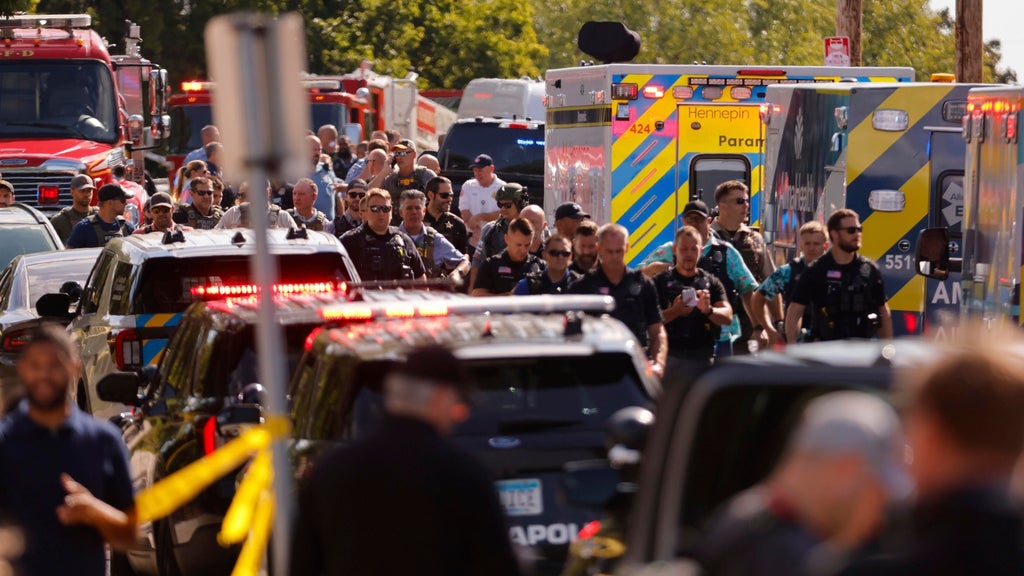Health
Doctors Reflect on Trauma After Minneapolis Church Shooting

The mass shooting at Annunciation Catholic Church in Minneapolis has left lasting scars on both survivors and first responders. While some injuries are visible, many others remain hidden, affecting the mental health of those who rushed to save lives on that tragic day.
Emergency personnel, including doctors and paramedics, were quick to respond when gunfire erupted during a service, targeting innocent children. Six victims from this horrific incident are currently being treated at Hennepin Healthcare, where medical staff continue to address both physical wounds and the emotional aftermath of the violence witnessed.
Ryan Mayfield, Assistant Chief of Hennepin County EMS, described the harrowing experience of the day. “There’s a part of your brain you have to turn off and just focus on the task and not think about the emotion,” he stated. Mayfield emphasized the significance of their role, noting that paramedics transported 14 patients within just 24 minutes of the initial 911 call.
The chaotic scene is one that Dr. Aaron Robinson, a physician at Hennepin Healthcare, will never forget. He expressed the shock felt by many on the scene, stating, “I’ve never felt that sense of just shock as being on that scene.” In order to assist the injured effectively, Robinson had to push through the trauma of what he witnessed.
Coordination among police, fire services, and EMS was critical in managing the crisis. Dr. Matt Prekker, who was at the hospital coordinating patient arrivals, noted the importance of the established emergency protocols. “The system that’s in place worked that day,” he explained, highlighting how pre-notification helped prepare their team for the influx of victims.
Despite the successful response, the emotional toll on first responders is significant. Robinson shared that professionals in the field often need to compartmentalize their feelings to focus on patient care. “Think about the medicine in the moment, think about what you need to do for your patient and let the emotion — the emotion comes later,” he said.
As they navigate their own healing processes, these medical professionals are leaning on colleagues for support. Prekker acknowledged the lasting impact of the event on their daily work environment, stating, “It’s a different feeling coming into the building each morning since this happened and I’m not sure when that gets back to normal.”
In the aftermath of the shooting, there has been a call for blood donations in Minnesota, which is currently facing a severe shortage. Medical professionals urge the community to contribute, emphasizing that anyone can be a hero by donating blood.
The trauma from this incident serves as a reminder of the unpredictable nature of violence and the profound effect it can have on individuals and communities. As first responders continue to process their experiences, the resilience of medical staff and their commitment to saving lives remains evident.
-

 Technology4 months ago
Technology4 months agoDiscover the Top 10 Calorie Counting Apps of 2025
-

 Health2 months ago
Health2 months agoBella Hadid Shares Health Update After Treatment for Lyme Disease
-

 Health3 months ago
Health3 months agoErin Bates Shares Recovery Update Following Sepsis Complications
-

 Technology3 weeks ago
Technology3 weeks agoDiscover 2025’s Top GPUs for Exceptional 4K Gaming Performance
-

 Technology2 months ago
Technology2 months agoElectric Moto Influencer Surronster Arrested in Tijuana
-

 Technology4 months ago
Technology4 months agoDiscover How to Reverse Image Search Using ChatGPT Effortlessly
-

 Technology4 months ago
Technology4 months agoMeta Initiates $60B AI Data Center Expansion, Starting in Ohio
-

 Technology4 months ago
Technology4 months agoRecovering a Suspended TikTok Account: A Step-by-Step Guide
-

 Health4 months ago
Health4 months agoTested: Rab Firewall Mountain Jacket Survives Harsh Conditions
-

 Lifestyle4 months ago
Lifestyle4 months agoBelton Family Reunites After Daughter Survives Hill Country Floods
-

 Technology3 months ago
Technology3 months agoUncovering the Top Five Most Challenging Motorcycles to Ride
-

 Technology4 weeks ago
Technology4 weeks agoDiscover the Best Wireless Earbuds for Every Lifestyle





















